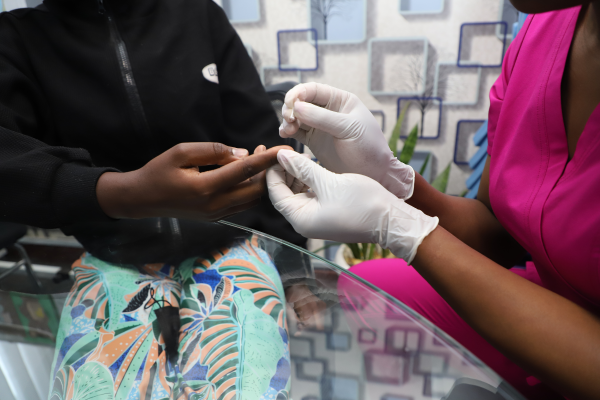Reciprocal Innovation Grant aims to optimize adolescent diabetes outcome

Around the world, the teen years are a time of intense changes and challenges. For adolescents with type 1 diabetes (T1D), especially those living in rural and underserved communities, these challenges can also impact health outcomes.
A team of researchers from Indiana University, Purdue University and Moi University connected through the AMPATH Kenya partnership to address the shared challenge of poor diabetes self-management behaviors and use of continuous glucose monitors among adolescents in Indiana and Kenya. The team recently received a $10,000 global health reciprocal innovation planning grant from the IU Center for Global Health and Indiana Clinical and Translational Sciences Institute (CTSI) to support the initial phase of their collaboration.
“Adolescents have lots of physiologic, cognitive, and social development processes that make diabetes self-care difficult,” said Tamara Hannon, MD, professor of Pediatrics and Medical & Molecular Genetics at IU School of Medicine, and the grant’s principal investigator. “This grant will support opportunities to learn about what each organization is doing and struggling with in terms of treating adolescent diabetes. We want to learn from each other how to use the strengths and resilience of adolescents to promote optimal diabetes outcomes in Indianapolis and Kenya.”
Continuous glucose monitoring (CGM) is considered the standard of care for people with T1D and involves a very thin sensor placed under the skin that alerts the person to high or low blood sugar without the need for a finger prick to draw blood for testing. Keeping blood sugars in target range prevents health complications from diabetes.
“In some areas of the world like Kenya, CGMs are not affordable or accessible,” continued Hannon, who also directs the pediatric diabetes program at Riley Hospital for Children that serves more than 1800 pediatric diabetes patients across the state of Indiana and surrounding states. “But even in the U.S. where they are accessible, sometimes people don’t wish to use them because they don’t want others to know that they have diabetes or that they are monitoring their blood sugar. They might not want to wear things like sensors on their bodies.”
Charity Wambui, MBChB, MPH, MMED, of AMPATH’s Chronic Disease Management program in Kenya, and Rachel Ogumbo, Pharm D, MBS, BCPS, adjunct clinical professor at Purdue University and AMPATH’s in-country pharmacy lead, are co-principal investigators and work together in AMPATH’s Home Glucose Monitoring program at the AMPATH chronic disease diabetes clinic. Wambui has run this program since 2012 and is a great supporter of improving adolescent diabetes care in Kenya.
“Our work with adolescents living with diabetes goes beyond the call of duty as care providers,” said Wambui. “It is a labor of love. It’s a constant lesson on life, on sacrifices and appreciation. We are proud to get this grant that will allow us to carry on carrying on, giving hope and health and putting smiles on young faces.”
“This project aligns with AMPATH’s mission by advancing the health of underserved populations through global partnerships, comprehensive care and collaborative research,” said Ogumbo. “In this project, we will explore the needs of adolescents with diabetes, introduce CGMs in Kenya, and support better use of CGMs in Indianapolis in a holistic and sustainable way.”
The group plans to collect preliminary data through a pilot study of photovoice, group-based diabetes management, and support groups to determine how best to promote better diabetes self-management behaviors and continued use of CGM. Photovoice is a research method in which participants share their lived experiences through journaling with photographs. These photos are then discussed in supportive group settings. This process enhances confidence, promotes engagement with peers and researchers, and improves dialogue surrounding clinical decisions that improves health and well-being.
The collaborators anticipate that these planning activities will inform a future clinical trial to evaluate new strategies for optimizing diabetes care in underserved settings in Indiana and Kenya.
The reciprocal innovation grants fund research in shared priority areas for global partners and Indiana with innovations that can work in diverse settings around the globe. “In global health research, reciprocal innovation is a collaborative process to exchange lessons learned and co-develop technology and health innovations with mutual benefit to health partners in both low- and middle-income countries (LMIC) and the United States,” said Laura Ruhl, MD, MPH, director of reciprocal innovation for the IU Center for Global Health. Investigators from the Indiana CTSI partner institutions (Indiana University, Purdue University, and the University of Notre Dame) are eligible to lead the grants with collaborators from both the U.S. and their partners in LMIC.
Over the last eight years, the Indiana CTSI and IU Center for Global Health have awarded more than $660,000 through the Global Health Reciprocal Innovation grant program. Supported by the Indiana CTSI and funding by the U.S. National Center for Advancing Translational Sciences (grant number UM1TR004402), the planning and demonstration grants are awarded annually.
For more information about the reciprocal innovation grants, please contact Laura Ruhl and ljruhl@iu.edu.